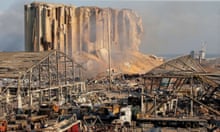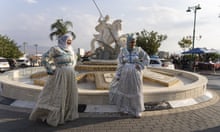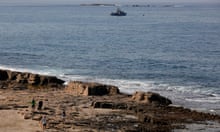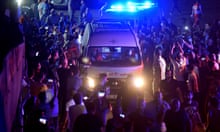The deadly explosion in Beirut on 4 August was likened to 15 years of war in 15 seconds by Lebanon’s ambassador to the UN, Amal Mudallali.
“It’s been hell,” says Sahar Assaf, an actor, director and professor of theatre at the American University of Beirut. “We’re still in disbelief and trying to fathom what happened. Each day we learn about a new loss, a new story.” Assaf is working to support artists through the crisis. “It feels like time stopped at the moment of the explosion. It’s devastating to witness all the destruction.”
How do you rebuild the country amid economic collapse and coronavirus? The Lebanese people immediately took to the streets and mobilised. They didn’t wait for instructions (and they would never come), they took up brooms and started clearing debris. Free food points and human chains passing heavy items across the steep stairs of Achrafieh invoked memories of the country-long human chain formed during the revolution last October.
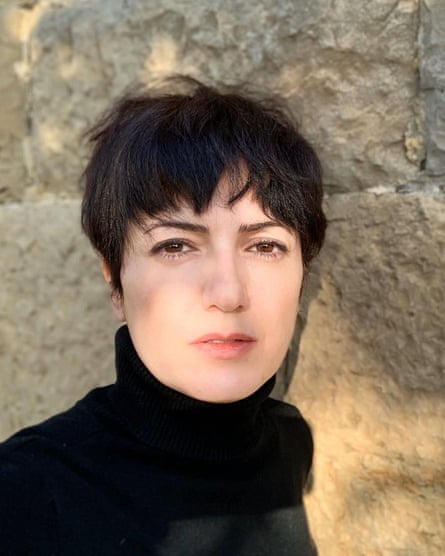
The Theatre Relief Group in Lebanon (TRG) has been set up and organised by over 100 theatre artists. “We all came together in a state of emergency two days after the explosion to try and think about how to best support our fellow artists who were wounded and those who have lost their homes or means of income.”
Almost every Beirut theatre is now in a state of disrepair following the explosion. This includes the Sunflower theatre set up by acclaimed actor Roger Assaf (no relation to Sahar) in the 1970s, and Al-Madina theatre in Hamra, where both Assafs collaborated on a 2016 production of King Lear, the first time Shakespeare was performed in Lebanese colloquial Arabic.
Holding power to account is a theme in Sahar Assaf’s work, as is offering a space to reflect on trauma and rehabilitation through theatre. Last May, she was in New York, with her three-month-old baby in tow, presenting No Demand, No Supply at the Between the Seas festival. This documentary theatre piece gave voice to the victims in Lebanon’s largest sex trafficking ring. This documentary aspect of her work started in 2014 when Assaf created Watch Your Step, a theatrical walking tour through Beirut that illuminated the repressed memories of the civil war. In 2018, Assaf’s promenade performance of Lorca’s Blood Wedding started at Hammana Artist House before moving to spaces across the village for residents to walk, dance, feast and watch together.
“We have always had to take things into our own hands but in times like these standing by one another and for one another becomes a responsibility, a survival mechanism,” says Assaf. “TRG aims to support the artists to regain their powers and return to creating the art that their communities need. We must survive first. Then we can tell the stories that help us understand our realities, express our rage, and imagine alternative orders. We need time to mourn the loss of lives and the loss of our city.”

The TRG is an “artist-to-artist initiative” with people raising funds and distributing the money to colleagues in need and it’s important to Assaf “to offer help while shielding the dignity and pride of the artists”.
The group’s first fundraising event is already under way. Beirut, No Show Tonight is described as “a performance that will not take place” and tickets are available on a donate-what-you-can basis; $3,500 of the $20,000 target was raised in the first week.
The TRG includes artists Hanane Hajj Ali, Sany Abdul Baki, Abdullah AlKafri and Karim Dakroub. If these artists were able to take to the stage, the audience would be in for an extraordinary evening. The international profile of Lebanese theatre has been thriving. Last year, Hajj Ali performed her solo show, Jogging, on a European tour including the Shubbak festival in London, and troupes such as Zoukak are internationally acclaimed. Assaf says: “It’s been so heartwarming to receive all of the positive and encouraging messages from our international fellow artists. Theatre unites and that’s why we need it to survive and thrive.”
Only weeks before the explosion, Assaf had been a part of the digital edition of Directors Lab Mediterranean, a programme endorsed by the Lincoln Center in New York that she co-founded in 2018.
Can Assaf see the future of her practice once the healing has begun to take effect? “I have lived through many catastrophes in my 40 years in this country, but the scale of this is like nothing else. Like many, I feel lucky to be alive and grateful my loved ones are unharmed, but I can’t help but feel guilty. The ‘what if’ scenarios are unbearable. The blast did not necessarily change how I feel about theatre, but it changed me as a human and so it will ultimately change my theatre when I am able to go back to it.”




